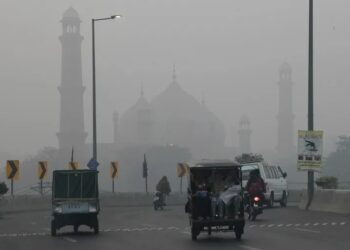Written by: Abdul Basit Alvi
National security is a vital element for any sovereign state, acting as the foundation for a nation’s stability and prosperity. It covers a broad array of issues, including military defense, economic security, cybersecurity, and public safety. As global interconnectedness increases, the significance of national security has grown, impacting areas from foreign policy to domestic welfare.
At its essence, national security focuses on safeguarding a nation’s sovereignty and territorial integrity. This involves protecting borders from external threats such as military aggression, terrorism, or illegal immigration. A secure nation can maintain its independence, allowing it to pursue its interests free from foreign interference. Additionally, national security is crucial for economic stability; a secure environment encourages investment and economic growth, leading to job creation and overall prosperity. In contrast, national security threats—like cyberattacks or geopolitical conflicts—can disrupt economies, erode investor confidence, and reduce resources for public services.
In the digital era, cybersecurity has become a critical component of national security. As dependence on technology rises, states face new challenges from cyber threats, including hacking, data breaches, and misinformation. Protecting vital infrastructure, financial systems, and sensitive data is essential for maintaining a nation’s security and public trust. Furthermore, national security encompasses public safety and the welfare of citizens. A secure environment fosters social cohesion and trust in government institutions, encouraging positive civic engagement and a sense of national identity. Conversely, security threats can breed fear, division, and unrest.
National security is not solely the responsibility of individual nations; it often requires international collaboration. In an age of transnational threats—such as terrorism, climate change, and pandemics—cooperation among countries is crucial. Strong diplomatic ties and collective security agreements can help mitigate risks and promote stability. Collaborating with other nations enhances a country’s ability to tackle complex security challenges.
The landscape of national security is continuously evolving. Traditional military threats are now accompanied by non-traditional challenges like climate change, resource scarcity, and public health crises. Nations must remain adaptable, regularly assessing and updating their security strategies to effectively address these emerging threats.
In light of these complex security challenges, the value of national security workshops has become increasingly clear. These workshops bring together military and civilian personnel to foster collaboration, share knowledge, and develop strategies that strengthen national security. Integrating diverse perspectives from both sectors is essential for a comprehensive approach.
National security addresses a wide range of issues, including defense against external threats, cybersecurity, counterterrorism, and disaster response. Traditionally, the military has led defense efforts, while civilian agencies have focused on diplomacy and social stability. However, the interconnected nature of these challenges calls for collaborative efforts between military and civilian sectors.
National security workshops provide a forum for dialogue, breaking down barriers and encouraging open communication, which is critical for building trust. This mutual understanding enhances collaboration during crises, facilitating quicker and more effective responses. Each sector brings unique expertise: military personnel contribute insights on strategic planning and operational readiness, while civilian experts offer knowledge on social dynamics, governance, and humanitarian issues. Workshops promote the sharing of best practices, allowing participants to learn from one another’s experiences and apply innovative solutions to security challenges. Addressing national security requires a multifaceted approach. These workshops encourage participants to think critically about security issues and consider the broader implications of their strategies. By collaborating on policy development, military and civilian professionals can formulate comprehensive strategies that tackle the root causes of insecurity rather than merely addressing the symptoms.
During crises—whether stemming from natural disasters, terrorist attacks, or pandemics—coordinated efforts between military and civilian entities are crucial. Workshops often feature simulation exercises that prepare participants for real-world scenarios, helping to identify potential coordination gaps, enhance response plans, and ensure effective collaboration between both sectors. National security is not just the responsibility of the government; it involves society as a whole. Workshops play a crucial role in raising awareness about citizens’ involvement in national security. By engaging community leaders, NGOs, and other stakeholders, they foster a sense of shared responsibility and encourage public participation in security initiatives.
Several countries exemplify the integration of military and civilian expertise through national security workshops. The United States has a longstanding tradition of organizing these workshops, involving both military and civilian agencies. The Department of Homeland Security (DHS) regularly conducts exercises to improve coordination among federal, state, and local entities. The National Defense University hosts workshops that unite military leaders and civilian policymakers to discuss strategies related to security, terrorism, and disaster response, emphasizing the need for a unified approach to effective crisis management.
In Germany, the Federal Office of Civil Protection and Disaster Assistance (BBK) organizes workshops that bring together military and civilian participants to prepare for potential crises like natural disasters or terrorist attacks. By involving military personnel alongside civil authorities, Germany enhances its emergency response capabilities. These workshops often include exercises that simulate real-life scenarios, allowing participants to practice coordination and communication strategies.
Australia has established the National Security College (NSC) at the Australian National University, which serves as a central hub for national security workshops featuring military and civilian leaders. The NSC conducts workshops addressing various security issues, including counter-terrorism, cybersecurity, and international relations, aiming to foster a comprehensive understanding of the security landscape and promote collaborative solutions.
Singapore emphasizes a whole-of-government approach to national security, with the Ministry of Home Affairs regularly organizing workshops that involve military, police, and civilian agencies. These workshops focus on counter-terrorism, crisis management, and public safety initiatives, enhancing national resilience in the face of security challenges.
In South Africa, the National Security Council conducts workshops that include military personnel, government officials, and civil society representatives to tackle security issues such as crime, terrorism, and social unrest. By involving diverse stakeholders, these workshops promote inclusive dialogue and collaborative strategies to strengthen national security.
Canada’s Public Safety Canada frequently hosts workshops involving military and civilian agencies to discuss national security policies and emergency preparedness. The National Emergency Management Agency (NEMA) conducts joint exercises with the Canadian Armed Forces to improve coordination in responding to natural disasters and security threats, highlighting the importance of collaboration for public safety and national resilience.
In Pakistan, the significance of national security workshops is immense, addressing a wide range of issues from terrorism to economic stability and disaster management. One of the key advantages of national security workshops in Pakistan is the strengthening of civil-military relations. Given the military’s historical significance in governance and security, fostering cooperation between military personnel and civilian policymakers is crucial. Workshops offer a platform for dialogue, allowing both sides to share their perspectives and strategies. This collaboration builds trust and understanding, ultimately resulting in more effective security policies.
Pakistan faces a range of security challenges, including terrorism, insurgency, and border management. National security workshops facilitate a comprehensive identification and analysis of these threats. By bringing together experts from various fields—such as intelligence, law enforcement, foreign policy, and disaster management—these workshops help develop integrated strategies that address both immediate and long-term security issues. Additionally, they often include training sessions aimed at enhancing the skills and knowledge of participants. This is particularly crucial for law enforcement agencies and local governments, which may have limited resources or expertise in specific areas. By offering training in crisis management, counter-terrorism tactics, and emergency response protocols, these workshops empower participants to respond more effectively in real-life situations. National security isn’t just the government’s responsibility; it requires the active participation of civil society, NGOs, and the general public. Workshops in Pakistan can enhance awareness about the importance of public involvement in security initiatives. Engaging community leaders and organizations fosters a sense of shared responsibility and strengthens resilience against security threats. This comprehensive approach is essential for building trust and cooperation between the state and its citizens.
Pakistan faces various crises, including natural disasters and health emergencies. National security workshops are vital for preparing for these situations by simulating scenarios and developing response plans. Such preparedness is crucial for minimizing the impact of crises and ensuring a swift recovery. By involving military and civilian agencies in these simulations, Pakistan can improve its overall crisis response capability.
In an increasingly interconnected world, national security challenges often cross borders. Workshops provide opportunities for Pakistan to collaborate with international experts and organizations. By participating in joint exercises and discussions, Pakistan can strengthen its diplomatic ties and share best practices with other nations facing similar security challenges. This collaboration not only enhances Pakistan’s security posture but also improves its standing in the international community.
National security workshops can significantly contribute to the formulation of effective security policies. By involving a diverse array of stakeholders—including government officials, military leaders, academics, and civil society—these workshops foster informed discussions that can lead to sound policy recommendations. This collaborative approach ensures that policies are realistic and address the complex nature of security threats.
The Kashmir region is a critical point of contention between India and Pakistan. For Pakistan, Kashmir is not just a territorial dispute; it is a significant aspect of its national identity, security, and regional strategy. Conversely, Pakistan’s involvement is equally important to the Kashmir issue, shaping the political, social, and economic landscape of the region. Kashmir holds profound historical and ideological significance for Pakistan. Following the partition of British India in 1947, the region’s status became a flashpoint for national identity. Pakistanis view Kashmir as part of their homeland, with its Muslim-majority population seen as culturally and religiously aligned with Pakistan. This connection creates a strong emotional attachment, making Kashmir a central element of national sentiment. The region is essential for Pakistan’s territorial integrity. The Kashmir dispute has significantly influenced Pakistan’s national security strategy and military posture, especially in relation to India. Controlling Kashmir not only bolsters Pakistan’s claim to the region but also acts as a strategic buffer against potential aggression. Its mountainous terrain offers natural defenses, making it a key area for military considerations.
Kashmir is abundant in natural resources, particularly water, which is crucial for Pakistan’s agriculture and hydropower sectors. The Indus River and its tributaries flow through Kashmir, forming the backbone of Pakistan’s irrigation system. Control over these water resources is vital for sustaining the agricultural economy, rendering Kashmir economically important for Pakistan’s development. Additionally, Kashmir plays a critical role in Pakistan’s foreign policy and diplomatic relations, particularly with India. The ongoing conflict enables Pakistan to spotlight human rights and self-determination issues on international platforms, aiming to garner support from global allies. Advocacy for Kashmir helps Pakistan maintain a narrative of solidarity with the Kashmiri people, reinforcing its role as a champion of their rights. Through diplomatic channels, Pakistan actively raises awareness about the human rights situation in IIOJK, drawing attention to concerns like civil liberties. This advocacy amplifies the voices of Kashmiris on the global stage, seeking international backing for their aspirations for self-determination.
Pakistan’s involvement is also significant in providing economic support to the Kashmir region. Despite varying governance structures, Pakistan assists areas like Azad Jammu and Kashmir (AJK), aiming to improve infrastructure, healthcare, and education. This support is crucial for the socioeconomic development of the region, directly impacting the lives of Kashmiri citizens.
The cultural and social ties between Pakistan and Kashmir are strong, with shared history, language, and traditions fostering a sense of community across the border. This cultural connection nurtures a bond that is vital for preserving the identity of Kashmiris who see themselves as part of a larger Pakistani identity.
Pakistan’s role in Kashmir is pivotal for maintaining stability in the region. A peaceful and engaged Pakistan can help mitigate tensions and promote dialogue. The complexities surrounding the Kashmir issue necessitate Pakistan’s involvement to ensure that any resolution respects the aspirations of the Kashmiri people and contributes to broader regional stability. The relationship between Kashmir and Pakistan is deeply interwoven, characterized by historical ties, ideological significance, and strategic interests. For Pakistan, Kashmir is integral to its national identity, security, and economic viability. Pakistan’s advocacy, support, and cultural connections significantly shape the political and social landscape of Kashmir. Resolving the Kashmir issue, rooted in the aspirations of its people, is essential for the future of the region and for fostering lasting peace and stability in South Asia.
National security conferences focused on Kashmir are crucial for shaping Pakistan’s approach to the region. These conferences serve as platforms for dialogue, policy formulation, and strategic planning, addressing the multifaceted dimensions of the Kashmir issue. They provide a vital space for policymakers, military leaders, scholars, and civil society representatives to discuss the complexities of Kashmir. By bringing together diverse perspectives, these conferences help raise awareness about the historical, cultural, and political significance of Kashmir for Pakistan. Building consensus among stakeholders enhances the effectiveness of Pakistan’s stance on Kashmir, uniting various voices in support of the Kashmiri people’s right to self-determination. The Kashmir issue requires a nuanced approach that considers both domestic and international dynamics. National security conferences enable experts to analyze current developments and develop strategies to inform Pakistan’s foreign policy. These discussions often emphasize diplomatic efforts, potential alliances, and ways to elevate the Kashmir issue on global platforms, ensuring that Pakistan remains proactive in advocating for the rights of Kashmiris.
Given the importance of Kashmir in Pakistan’s national security framework, collaboration between military and civilian sectors is crucial. National security conferences facilitate this collaboration by providing a platform for military leaders to engage with policymakers and civil society. This interaction fosters mutual understanding and trust, ensuring that security strategies related to Kashmir are comprehensive and well-coordinated. The human rights situation in IIOJK has drawn significant international attention, especially following the abrogation of its special status. National security conferences in Pakistan offer a platform to address these concerns comprehensively. Experts and activists can discuss the impact of ongoing conflicts on civilians, raising awareness about human rights violations. This focus not only underscores the plight of Kashmiris but also bolsters Pakistan’s moral standing in advocating for their rights on international platforms.
The Kashmir issue has ramifications for regional stability, potentially escalating tensions between India and Pakistan. National security conferences can concentrate on crisis management strategies, preparing for various scenarios that may arise from heightened tensions. By discussing contingency plans and fostering cooperation among security agencies, these conferences enhance Pakistan’s readiness to respond effectively to any escalation.
These conferences also serve as venues for formulating diplomatic strategies aimed at garnering international support for Pakistan’s position on Kashmir. By inviting international experts and representatives from other countries, they facilitate dialogue that can influence global opinion. Strengthening diplomatic ties and building coalitions with countries sympathetic to the Kashmir cause are vital for Pakistan’s efforts to bring the issue to the forefront of international discussions.
A unified national narrative on Kashmir is crucial for Pakistan’s domestic and international policies. National security conferences assist in crafting a coherent message that resonates with both the public and the international community. By highlighting the historical context and the aspirations of the Kashmiri people, these conferences reinforce Pakistan’s commitment to supporting their struggle for self-determination, thereby strengthening national identity and cohesion.
National security conferences focusing on Kashmir are critical for Pakistan, as they provide a platform for raising awareness, formulating policies, and enhancing civil-military collaboration. These conferences play a significant role in addressing human rights concerns, preparing for crises, and shaping international diplomatic efforts. As Pakistan navigates the complexities of the Kashmir issue, these conferences will remain essential for developing comprehensive strategies that advocate for the rights of the Kashmiri people while promoting regional stability.
In this context, the recent national security workshop on Kashmir held in Muzaffarabad was a commendable initiative. Jointly organized by GOAJK and the Pak Army, the arrangements were impressive. Participants came from various sectors of society, including politicians, civil servants, health officials, academics, and media representatives. The selection of speakers was excellent, with former AJK President Sardar Masood Khan and ex-diplomat Maleeha Lodhi providing comprehensive insights into the Kashmir issue and Pakistan’s foreign policy efforts in this regard. Throughout different sessions, participants had valuable opportunities to learn about the strengths, opportunities, and challenges in AJK as well. The Corps Commander of 10 Corps and the GOC of 12 Division delivered engaging and thorough lectures, effectively dispelling many misunderstandings and myths about the Pakistan Army, Kashmir, and related policies. They consistently demonstrated their unwavering commitment to Kashmir, its cause, and its people. Their interactions conveyed a clear message that Pakistan, the Pakistan Army, and Kashmir are united. They eloquently expressed Pakistan’s and the Pakistan Army’s dedication to AJK and the Kashmir cause. The Corps Commander and GOC have always viewed AJK as their home, and this sentiment has been reciprocated by the people of AJK. Workshop participants had the chance to visit PDO, the AJK Legislative Assembly, and AJK University, where they gained valuable insights into the region’s progress and potential for further growth. Different sessions highlighted the impact of false propaganda and misinformation, while discussions also focused on the media’s role in addressing the Kashmir issue. The quality of the questions and answers during the workshop was impressive, with participants engaging openly and receiving detailed responses. ISPR, the Commander of the 1 AK Brigade and his team, excelled in selecting high-quality participants and organizing the event, demonstrating great dedication to its success. Overall, the workshop conveyed a strong message to the people of AJK, serving as an effective platform for sharing facts, strengthening connections, and dispelling misunderstandings.
Pakistan and AJK stand as beacons of hope for the people of IIOJK, who are unable to voice their concerns over human rights violations and advocate for their right to self-determination. Both Pakistan and AJK are committed to raising awareness of the dire situation in IIOJK on the global stage. Given the current circumstances in Pakistan and AJK, such events are not only uplifting but also essential for fostering understanding and awareness about the realities on the ground regarding AJK and the Kashmir issue. The people of AJK and various sectors of society have embraced this commendable initiative to bring all stakeholders together to discuss core issues.

























